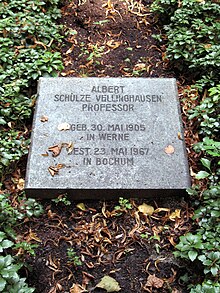Albert Schulze-Vellinghausen

Albert Schulze Vellinghausen (born May 30, 1905 in Werne (now Bochum), † May 23, 1967 in Bochum -Werne) was a German art collector, critic (abbreviation: ASV), bookseller ("Bücherstube am Dom" in Cologne) and translator .
Life until 1945
Schulze-Vellinghausen was born as the son of a mine director and a large landowner in the then independent Werne near Bochum. From 1924 he studied law, later art history, archeology and philosophy. Study locations were Geneva, later Freiburg im Breisgau, Munich, Cologne and Bonn. Through his studies he was fascinated by the Romance-speaking area. Among other things, he studied with Paul Clemen , Wilhelm Worringer , Julius von Schlosser and Ernst Robert Curtius . After a short professional activity in Berlin, Schulze-Vellinghausen became a bookseller in Cologne in 1933. This activity was his professional refuge even during the Nazi era; nevertheless he comes into conflict with the cultural policy of the Third Reich. During the war, due to his poor health, he was not called up for front service, but because of his good knowledge of French he had to serve in the defense department in a prisoner-of-war camp in Münsterland. Here he secretly helps the prisoners to make the time bearable for them. After the war they thank their "Monsieur Albert" with personal visits.
Activity as a critic and author
After the war, Schulze-Vellinghausen began to write poems, feature pages and essays. He then worked for newspapers and magazines, namely for Die Tat (Zurich), Der Kurier (Berlin) and Der Mittag (Düsseldorf). He also worked as a translator and translated dramas and poetry by Jean Follain , Jean Cocteau , Jean Giraudoux and Pierre Carlet de Marivaux . In 1953 Schulze-Vellinghausen became a permanent correspondent for the Frankfurter Allgemeine Zeitung . Above all, he reported on the social and cultural life in North Rhine-Westphalia and "forces the [...] public [...] to also take note of the Ruhr area as a cultural landscape". In doing so, he rewrote various museums that were then nationwide such as the Karl Ernst Osthaus Museum in Hagen , the Folkwang Museum in Essen and the Museum am Ostwall in Dortmund . Furthermore, he was one of the godparents of the Ruhr Festival in Recklinghausen .
Art collector
As an art lover, he owned an extensive collection of modern art (including those from Josef Albers , Günter Fruhtrunk , HAP Grieshaber , Joseph Beuys , Lucio Fontana , Otto Piene , Victor Vasarely , Cy Twombly ), which he bequeathed to the Ruhr-Universität Bochum in his will . He tied this foundation to the condition that the collection would be further expanded by the state of North Rhine-Westphalia .
Albert Schulze-Vellinghausen was an authority as an art collector; he was a member of the documenta council of the 4th documenta of 1968 in Kassel . He was particularly committed to informal art, which he saw as a way out of totalitarian politicization in fascism and Stalinism:
“As in politics, the avant-garde had to withdraw from the wings towards the center. This is the seat of sincere unconditionality, after it has been shown in these times of mechanization that the deadly bacteria of Stalinism and fascism are the first to invade pseudo-radical external positions. Those who cannot see that already have the enemy in themselves. "
Honors
Schulze-Vellinghausen received various honors. He was a member of the PEN Club and the Association International Crtiques d'Art. The state government of North Rhine-Westphalia awarded him the title of professor. He was also chairman of the committee for painting at the Kassel Documenta .
Schulze-Vellinghausen lived in Kley until his death . His grave is in Dortmund's Ostfriedhof .
literature
- Albert Schulze-Vellinghausen: Young Artists 1958/59. Cologne 1958, p. 30.
- Theater heute 1, 1960, No. 2: Poles of modern world theater. A controversy. With contributions by Kenneth Tynan, Eugène Ionesco, A. Schulze-Vellinghausen, S. Melchinger and J. Kaiser.
- Albert Schulze-Vellinghausen: Theater criticism 1952-60. Selected and provided with an afterword by Henning Rischbieter. Friedrich Verlag, Hanover 1961.
- Albert Schulze Vellinghausen, Maria Wimmer: 1962, text and picture part + record (Theater heute series, volume 3).
- Albert Schulze Vellinghausen: Allusions - Selected speeches, essays, reviews on the fine arts, literature, architecture etc. 1962.
- Josef Reding : chroniclers of the Ruhr area. Albert Schulze Vellinghausen, Helmuth de Haas, Friedhelm Baukloh. In: ders .: The human being in the area. Essays. Cologne 1988, pp. 120-135.
- Egoist 12th homage to Albert Schulze Vellinghausen. With a lithograph by Raimund Girke. F. September 1967. 3rd volume issue 2. 11 b / w Fig. 32 p.
- Ilina Fach: Exhibition policy and didactics of the Ruhr Festival Recklinghausen (1950–1974). Inaugural dissertation in art history in the cultural and geosciences department at the University of Osnabrück, submitted in October 1998 ( dissertation as PDF ).
Web links
- Memorial page of the Ruhr University Bochum
- Albert Schulze-Vellinghausen in the Lexicon of Westphalian Authors
Individual evidence
- ↑ a b c d cf. Josef Reding: The human being in the area, p. 122f.
- ↑ cf. Josef Reding: Man in the Revier, p. 123.
- ↑ cf. Josef Reding: Man in the Revier, p. 125.
| personal data | |
|---|---|
| SURNAME | Schulze-Vellinghausen, Albert |
| ALTERNATIVE NAMES | ASV; Schulze Vellinghausen, Albert |
| BRIEF DESCRIPTION | German critic, bookseller and translator |
| DATE OF BIRTH | May 30, 1905 |
| PLACE OF BIRTH | Werne |
| DATE OF DEATH | May 23, 1967 |
| Place of death | Bochum -Werne |